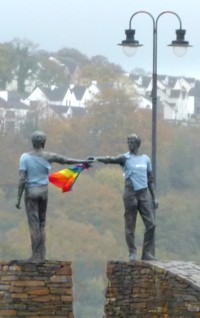Prehistory
During this trip we would see evidence of this and visit, still existing, ancient religious sites that long pre-date Christianity.
As the the ice of the last glacial maximum withdrew, about 12,000 years ago, genetically modern stone age humans moved in to the new lands to make a living as nomadic Neolithic herdsmen. Over the next ten millennia clever individuals developed fired pottery and then early metallurgy and these technologies were carried here by successive waves of invaders.
Technological progress empowers invasion or conquest, resulting in its own dissemination. Thanks to these successive waves of invaders, Irish technology was already well in advance of Australia's over seven thousand years ago.
True 'civilisation' is based on organised cultivation, as opposed to hunting and gathering or nomadic herding. This leads to land ownership and the requirement for an authority capable of granting and enforcing title to those lands. Initially a town may have maintained a volunteer force to enforce local rules of ownership and civil society and to repel invaders but with agricultural expansion this quickly leads to city states then, fiefdoms, countries and empires.
Ireland was remote from the great civilisations of the first few millennia before the Common Era (BCE). Elsewhere in Europe great empires formed and fell or were consumed, starting with the Egyptians and Akkadians/Mesopotamians around three millennia BCE. With the development of Iron the Persians, under Cyrus the Great, then the Greeks, under Alexander the Great, followed by the Romans created vast empires, encompassing most of Europe north Africa and the middle east pushing eastward to the borders of India. At the same time in the east the great Chinese empires followed or often led those in Eurasia.
With the Iron Age new weapons came to Ireland, favouring the strong and the bold, and Ireland, like nearby Scotland, became a wild land, occupied by waring tribes who measured wealth by the number of cattle they possessed and where a chieftain's success was measured by how many cattle his clan could steal from his neighbours in organised raids. In this context civilisation (town dwelling culture) was limited to trading and manufacturing centres, for example towns specialising in pottery making, weaving and smelting and working metals.
Ancient Ireland
The ancient Celts of Ireland, like almost all early peoples, had an animistic religion in which places rivers mountains forests rocks animals, and so on, were possessed of spirits (were in some way animated or alive), similarly the dead, particularly ancestors continued on as spirits. Every religion is perpetuated by being handed on to our young as they learn to speak, as are our culture's social rules and mores. Thus religions are very persistent. As a result, despite several thousand years of suppression, animism survives throughout northern Europe and in Asia as witchcraft, Druidic religion and Shamanism and remains influential in Spiritualism and some forms of environmentalism or Nature Worship. It's the default religion of humankind, perhaps pre-dating modern humans, and various incarnations are found among native people in Africa; Asia; the Americas; and Australasia and Micronesia; indeed among humans everywhere.
As each stage of civilisation required more organisation, many of the animistic spirits like those responsible for: successful harvests; the weather; natural disasters; relationships; stages in life; and so on, became gods, many with a professional priesthood. In early Biblical history the God of Abraham was still contested by other gods, like Baal, and we can still see this in the Indian sub-continent and East Asia today.

